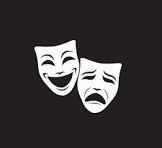
posted 10th February 2025

Debating and drama are both popular activities in schools. Even if they’re not actors, all students will study drama as part of the English curriculum. And we all experience drama every time we watch a film or a boxset.
What do debating and drama have in common? What can debaters learn from drama, and what can debating teach you about drama?
What debating and drama have in common
1. They’re both about conflict
A play or film in which everyone gets on with everyone else and no one has any problems wouldn’t be very interesting to watch. A happy, contented family with no worries is nice to live in but is not the stuff of great drama. But if the daughter suddenly realises she has fallen in love with the son of her father’s worst enemy, then you’ve got a drama. Which will she choose: love or duty? That’s the dilemma - the conflict - that gets Romeo and Juliet moving.
Similarly, debates have to be about issues on which people disagree, and problems which need solving. There’s no point in debating whether or not racism is a bad thing, because everyone agrees it is; there’s no point in debating whether women should be given the vote, because they already have been. But you can debate whether or not enforcing race-based quotas for employment is the right response to racism, as not everyone agrees it is; you can debate whether or not it should be mandatory for 50% of government ministers to be female, as that may (or may not) solve the problem of the underrepresentation of women in politics. These conflicts get those debates moving.
2. Many dramas contain debates
Sometimes the debate is an open and public discussion between two characters with opposing points of view, and the outcome of the debate contributes to the outcome of the drama. An example is Caesar’s funeral in Shakespeare’s Julius Caesar, at which Brutus and Anthony take turns to make speeches about Caesar in front of a large crowd. Brutus argues it was right to assassinate Caesar; Antony says it wasn’t. Anthony is much the more persuasive speaker, and is therefore able to stir up a mob to attack Brutus and his fellow-conspirators.
Sometimes the debate is internal, as in Macbeth’s soliloquy ‘If it ‘twere done when it were done …’ in which he wrestles with his conscience as he puts the arguments for and against murdering King Duncan.
Sometimes the whole play is a debate about one issue, as in Brian Clark's play Whose Life Is It Anyway?. There is not much physical action in this play, as the main character, Ken Harrison, is paralysed from the neck down following a car accident. However, there is plenty of conflict, as he argues for his right to end his life. The play dramatises, without taking sides, the debate on assisted dying.
3. You have to take a role
If you’ve ever acted in a play, you will know that it involves being someone you’re not. Your assigned character might be wholly sympathetic, or they might try to do the right thing but end up doing the wrong thing, or they might be a murderous psychopath. Whoever they are, you need to get inside their head, think like them, feel like them, see the world through their eyes. You become someone else; you are taken out of yourself.
Similarly, in a debate you have to take the side you have been given, whether you agree with it or not. You may have to get inside the head of someone who supports assisted dying even if you believe euthanasia is against God’s will; you may have to argue for the abolition of private schools when you love your own private school and owe everything to it.
You also have to take on a role within the debate: opening proposition is a very different character, with very different priorities, from closing opposition. That’s why you address each other by your titles, as ‘prime minister’, ‘opposition whip’, etc., to remind yourself you are no longer Ben or Ayesha. You have become someone else.
4. The conflict is not resolved
The end of a drama may resolve the plot conflicts, but (if the drama is any good) it will not resolve the moral conflicts. At the end of Romeo and Juliet, both main characters are (spoiler alert) dead, but the question of whether they were right to choose love over duty is very much alive, and unresolved. In Julius Caesar, Antony wins the debate with Brutus, but we can (and should) go on arguing forever about whether Brutus and his comrades were right to kill Caesar. Macbeth decides in the end (spoiler alert #2) to kill Duncan, but generations of theatre goers and English students have debated, and will always debate, whether or not he remains a sympathetic character. Whose Life Is It Anyway? doesn’t tell you what to think about assisted dying, but it does make you think and debate with yourself whether it should be legal or not.
Plays or films which only allow you to think one way are not usually very effective drama, and are certainly not the sort you will want to see again and again. As the Russian writer Chekhov said, ‘The role of the artist is to ask questions, not to answer them.’ Good art - good drama - asks questions to which there are many possible answers.
The same is true of a good debate. If the proposition wins a debate on the motion This house would legalise assisted dying, it does not prove that assisted dying is right. It just proves that the proposition made a more persuasive case than the opposition. If it was a high scoring, closely fought debate, it will help everyone listening to it to come to their own conclusion, or at least to understand both sides of the question. But it will not give a final answer.
There is one important way in which debating and drama are different, however.
While a drama, whether on stage or in a film, seems to have an uncertain outcome (and will be uncertain to the audience or viewer if they haven’t seen it before) it will have been carefully scripted, so that the conclusion is determined before it starts, known to all the actors. A debate, on the other hand, is not scripted. A really successful debate is a dynamic, unpredictable affair, in which the debaters are constantly aware of, and constantly responsive to, the actions of the other side, adapting what they say from moment to moment. In this respect at least, debating is more like sport than drama. But





